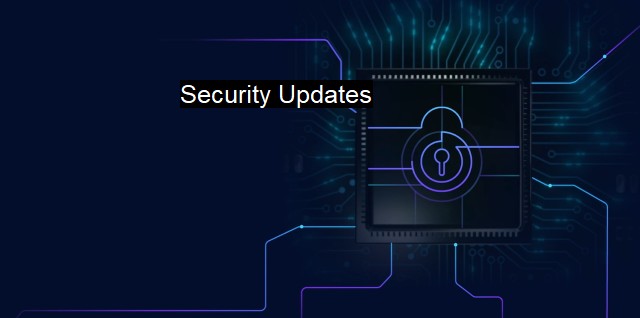What are Security Updates?
Why Security Updates Are Crucial in the Fight Against Cyber Threats- Protect Your Network in Today's Interconnected World
Security updates are critical for the maintenance and protection of computer systems and networks against the constant threat of hackers, viruses, data breaches, and other cyber threats. In a world where technology is advancing at such a fast pace, the importance of security updates cannot be overstated.In the context of cybersecurity and antivirus protection, security updates refer to the new versions or patches released by software developers and vendors to fix bugs and vulnerabilities that may have been discovered in the existing iterations of their software. This means a security update may stop potential cyber-attacks by filling in key weakness points in the computer's defense before any further damage can be made.
Cybersecurity is an important aspect of any organization's information technology infrastructure. It involves protecting computer systems and networks from theft, damage, or misuse of their electronic data. Since the cyber threat landscape is increasingly evolving, regular security updates become an absolute necessity.
Each software component of a computer system has potential vulnerability points that can be exploited by hackers or malicious software (malware). This includes the operating system, web browsers, applications, and even the antivirus software itself. The responsibility of the developers is to continuously monitor these software components, identify any vulnerabilities, and release security updates to fix them.
One concrete example of the paramount role of security updates can be seen in antivirus protection. Antivirus software acts as the first line of defense against malware and cyber threats. Its primary function is to detect, prevent and remove malicious software.
Antivirus protection is not infallible. As new malware strains are created and old ones evolve, it becomes more difficult for any antivirus application to maintain its efficiency in identifying and defending against these attacks. This makes continuous security updates essential to expand the database of the different types of malware the software can recognize and protect against. Updated antivirus software ensures that the system can adequately deal with any new security threats.
Another critical aspect of security updates lies in their frequency and timing. Often, when a vulnerability is found, developers rush to release a security update to prevent attackers from taking advantage of it. This renders any delay in applying these updates an open invitation to cyber intruders. Hence, the system users or administrators must regularly check for and install security updates to ensure the maximum possible protection.
While security updates are crucial, they aren't the complete solution to cybersecurity. Different systems experience different issues, and one security update might not address all vulnerabilities. Therefore, it is equally important to maintain a broader cybersecurity strategy that includes practices like using a secure network, educating staff about safe internet practices, and encrypting sensitive information.
To sum up, security updates are like vaccinations for digital environments - providing prevention against known security threats, vulnerabilities, and weaknesses. They play a vital role in keeping software secure, secure data transmission, and the overall health of the digital landscape. Therefore, ensuring all software applications, operating systems, and antivirus protection systems are up-to-date with the latest security updates must be a priority for all users and organizations. This way, they increase the possibility of staying ahead of potential cyber threats and minimize the risk of being victimized by the ever-evolving and increasingly sophisticated world of cybercrime.

Security Updates FAQs
What are security updates and why are they important for cybersecurity?
Security updates refer to software patches or fixes released by manufacturers to address vulnerabilities and security flaws in their products. They help protect against potential cyber attacks and ensure the security and integrity of the system. It is important to keep up with security updates to ensure that your system is protected against the latest threats.How often should I update my antivirus software for maximum protection?
It is recommended to update your antivirus software at least once a day to ensure maximum protection against the latest threats. However, some antivirus programs are set to update automatically, so it is important to check your program's settings to ensure that you are receiving the latest updates.Can security updates affect the performance of my computer or other devices?
Security updates can sometimes affect the performance of your computer or devices, but the impact is usually minimal. Some updates may require a restart of your device, which may cause a brief interruption in service, but this is generally a small inconvenience compared to the potential security risks of not updating.What should I do if an update fails or causes issues with my system?
If an update fails or causes issues with your system, you should contact the manufacturer or vendor of the software or device for assistance. They will likely provide guidance on how to resolve any issues and may release a new update to address the problem. It is important to report any issues to the manufacturer or vendor, as they can use this feedback to improve their products and services.| | A | | | B | | | C | | | D | | | E | | | F | | | G | | | H | | | I | | | J | | | K | | | L | | | M | |
| | N | | | O | | | P | | | Q | | | R | | | S | | | T | | | U | | | V | | | W | | | X | | | Y | | | Z | |
| | 1 | | | 2 | | | 3 | | | 4 | | | 7 | | | 8 | | |||||||